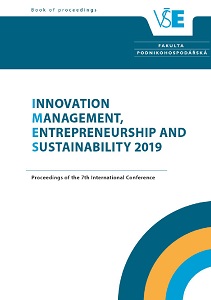Brazilian Students’ Entrepreneurial
Intentions, Confidence and Competences
Brazilian Students’ Entrepreneurial
Intentions, Confidence and Competences
Author(s): André Fleury, Diane Reis
Subject(s): Social Sciences, Economy
Published by: Vysoká škola ekonomická v Praze
Keywords: Entrepreneurship; entrepreneurship education; entrepreneurial competences
Summary/Abstract: Purpose: This study aims to evaluate students' entrepreneurial competences, intentions andconfidence, before and after entrepreneurship teaching courses. Emerging in a scenario whereentrepreneurs constantly face a challenging environment, and where the association ofentrepreneurship with economic growth, innovation and job creation are always present. Someresearchers believe that entrepreneurial competences can be teachable, not being innate, aidingentrepreneurs with better results and contributing to a nation’s economic development.
Design/methodology/approach: The case study method applied in the research allowsa comparison between different scenarios. The cases studies were developed in two courses,both with the same model and focus on teach entrepreneurship, at the University of São Paulo(USP), in the second half of 2018. Achieving as respond rate 62% in the pre-coursequestionnaire of both courses, and 42% and 51%, respectively, in the post-course questionnaire,with groups of 60 students and 79 students, respectively.
Findings: The study discovered that the courses always assist in develop the students’entrepreneurial intention and competences, but they do not always assist in develop theentrepreneurial confidence. The students expect to improve entrepreneurial competences andlearn more about entrepreneurship, by attending the courses. Thus, this study contributes toways of measuring the results of entrepreneurship teaching courses, a currently challenge.
Research/practical implications: The research contributed with ways of measuring theoutcomes of entrepreneurship teaching courses. Leaving for future research the investigation ofthe students’ entrepreneurial competences, confidence and intention in other scenarios.
Originality/value: This study is original because it explored an unexplored database, evolvinga data collection and analysis, besides being an attempt to measure the outcomes ofentrepreneurship teaching courses, contributing to the entrepreneurship education evolution.
- Page Range: 41-51
- Page Count: 11
- Publication Year: 2019
- Language: English
- Content File-PDF

